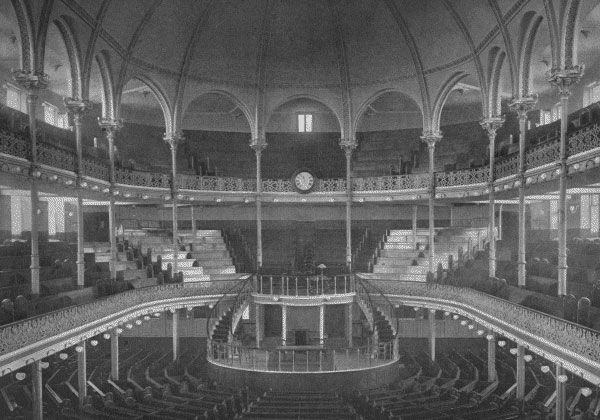
If God has indeed ‘shone in our hearts to give the light of the knowledge of the glory of God’, it is only ‘in the face of Jesus Christ’ that this knowledge may be found (2 Corinthians 4:6).
A constant stream of books and sermons encourages the church to pray. Exhortation to pray is the easiest part of promoting prayer, as many have acknowledged. Yet the problem is personal and I too am part of that problem, part of the present malaise and superficiality which seems to afflict the churches. Talk to members and ministers of different churches and you will hear the same sigh of concern. We know that some of our forefathers were champions of prayer, and their biographies often speak of amazing feats performed through prayer. But this merely increases our own sense of lack. Yet surely, we do need to be disturbed about this?
Preoccupied with self
It has been reported that there were occasions when C. H. Spurgeon was leading prayer in the Metropolitan Tabernacle, or praying in private, when he felt so carried away that it was a shock for him to open his eyes. He had come into such a deep sense of the presence of the living God, that to find himself still earthbound was a shock. Now, while all would grant that Spurgeon was a remarkable servant of God, his experience underlines our need to recover the biblical emphasis that focuses more upon God than on the needs of the believer. We need a greater consciousness of God himself, an awareness which identifies and challenges our preoccupation with self.

Again, this is easier said than done! We know that God gives grace for spiritual growth. However, we should cultivate the attitude towards God shown by the writers of Scripture, and particularly of the psalms. The psalter is very special to all believers, and surely its preoccupation, even obsession, over its whole, amazing range of subject-matter and circumstance, is with God himself. Of course, the setting of each of the 150 psalms is that of the writer’s own circumstances and needs. But these writers counsel themselves, and others, to put their needs into the context of God’s sovereign and gracious purposes: ‘I have set the Lord always before me’ (Psalm 16:8). Our prayers must more and more affirm God’s sovereignty, holiness and glory in our lives. The Lord will surely bless those who honour him in this way.
Preoccupied with the world
We too easily allow ourselves to be preoccupied with the ‘here-and-now’; ‘this world is too much with us’. This is not a plea for detached pietism, which sticks its head in the clouds or contemplates retreats. Rather, it is a plea to view all our circumstances against the background of God’s concern for us. That means we will pray from the same standpoint as the psalmist, and live in true, respectful humility before God. Some people love activity and all believers want to improve the church’s effectiveness. But human efforts must be informed by a true spirit of prayer, or the result will be low spirituality and deep frustration.

What do we pray for most? How much time is taken up in prayer with ourselves or our particular interests? How much do we pray for the needs of others? Praying is a Spirit-inspired privilege, but it is also the discipline of seeking the Lord’s presence. Take heed of the advice, ‘Pray using the words of Scripture.’ Here again psalms such as Psalm 116 are very helpful to ponder. It is wonderful when the psalmist’s experience finds a conscious echo in our own lives.
Know that the Lord is God
This discipline of seeking God often exposes my own superficiality in reading the Scriptures, my own lack of spiritual appetite and biblical apprehension of God’s place in my life. Yet I am a believer. I have studied Scripture and delighted to read books about God’s blessings in times past. My problem (and does this find an echo with others?) is one of trying to ‘cover the ground’ spiritually, but finding that I am still not overwhelmed by the grace of God and melted by a sense of God’s glorious concern for me. No — my problem is more than that! I must come to see God as he is, glorious and wonderful, just because he is God! There are some psalms, which simply praise and worship God for being himself! Psalm 100 helps me to break out of earth-bound and self-centred praying and share in this testimony of the people of God: ‘Know that the Lord is God. It is he who made us, and we are his; we are his people, the sheep of his pasture … For the Lord is good and his love endures forever; his faithfulness continues through all generations.’

But how may I know God? The answer is, through Christ revealed in the Scriptures. Through the Scriptures, comes that knowledge of God which leads to delighted appreciation of and praise for him. Problems in prayer are never on God’s side of the fence. Our God hears us and he will answer, for he ever delights in us, his servants through Jesus Christ. But I must come into his presence in the prevailing name of Jesus Christ the only Mediator. I must ask, seek and knock my way into a deeper awareness of him, through Christ who loves me so much. All growth in grace can only be because that grace has already been secured through the Lord Jesus. If God has indeed ‘shone in our hearts to give the light of the knowledge of the glory of God’, it is only ‘in the face of Jesus Christ’ that this knowledge may be found (2 Corinthians 4:6).
An important question
But do I really want to grow in true knowledge of him? This is an all-important question. The world has honours, recognitions and rewards enough, but do I really desire ‘the one thing that is needful’? Let us pray for one another, that we may come into this true apprehension of our glorious heritage in God. ‘Then they who feared the Lord talked with each other, and the Lord listened and heard. A scroll of remembrance was written in his presence concerning those who feared the Lord and honoured his name’ (Malachi 3:16).






